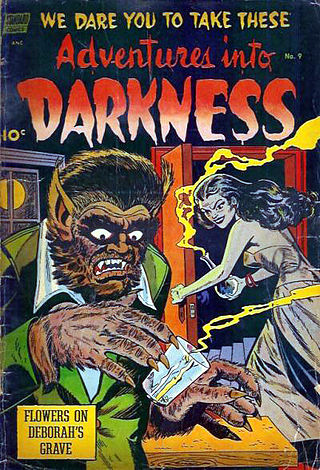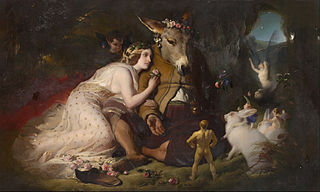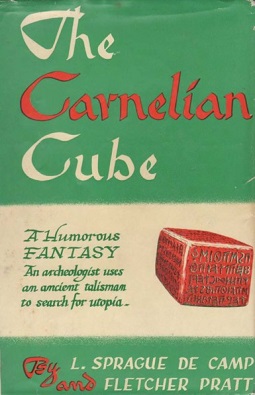
Alternate history is a subgenre of speculative fiction in which one or more historical events have occurred but are resolved differently than in actual history. As conjecture based upon historical fact, alternate history stories propose What if? scenarios about crucial events in human history, and present outcomes very different from the historical record. Some alternate histories are considered a subgenre of science fiction, or historical fiction.

White Wolf Entertainment AB, formerly White Wolf Publishing, was an American roleplaying game and book publisher. The company was founded in 1991 as a merger between Lion Rampant and White Wolf Magazine, and was initially led by Mark Rein-Hagen of the former and Steve Wieck and Stewart Wieck of the latter. White Wolf Publishing, Inc. merged with CCP Games in 2006. White Wolf Publishing operated as an imprint of CCP hf, but ceased in-house production of any material, instead licensing their properties to other publishers. It was announced in October 2015 that White Wolf had been acquired from CCP by Paradox Interactive. In November 2018, after most of its staff were dismissed for making controversial statements, it was announced that White Wolf would no longer function as an entity separate from Paradox Interactive.

Stormbringer is a magic sword featured in a number of fantasy stories by the author Michael Moorcock. It is described as a huge, black sword covered with strange runes, created by the forces of Chaos. The sword has a will of its own and it is hinted that the sword may be controlled by an inhabiting entity. It is wielded by the doomed albino emperor Elric of Melniboné. Stormbringer makes its first appearance in the 1961 novella The Dreaming City. In the four novellas collected in the 1965 book Stormbringer, the sword's true nature is revealed.
A parallel universe, also known as an alternate universe, parallel world, parallel dimension, alternate reality, or alternative dimension, is a hypothetical universe co-existing with one's own, typically distinct in some way. While the six terms are generally synonymous and can be used interchangeably in most cases, there is sometimes an additional connotation implied with the term "alternate universe/reality" that implies that the reality is a variant of our own, with some overlap with the similarly named alternate history. The sum of all potential parallel universes that constitute reality is often called the "multiverse".
World of Darkness is a series of tabletop role-playing games, originally created by Mark Rein-Hagen for White Wolf Publishing. It began as an annual line of five games in 1991–1995, with Vampire: The Masquerade, Werewolf: The Apocalypse, Mage: The Ascension, Wraith: The Oblivion, and Changeling: The Dreaming, along with off-shoots based on these. The series ended in 2004, and the reboot Chronicles of Darkness was launched the same year with a new line of games. In 2011, the original series was brought back, and the two have since been published concurrently.

Werewolf fiction denotes the portrayal of werewolves and other shapeshifting therianthropes, in the media of literature, drama, film, games and music. Werewolf literature includes folklore, legend, saga, fairy tales, Gothic and horror fiction, fantasy fiction and poetry. Such stories may be supernatural, symbolic or allegorical. A classic cinematic example of the theme is The Wolf Man (1941) which in later films joins with the Frankenstein Monster and Count Dracula as one of the three famous icons of modern day horror. However, werewolf fiction is an exceptionally diverse genre, with ancient folkloric roots and manifold modern re-interpretations.

Time of Judgment is a series of roleplaying game scenario books for the World of Darkness settings of White Wolf Game Studio. These scenarios are presented as the semi-canonical endings of the original World of Darkness, as preparation for the new version of the setting. As the Time of Judgment approaches, vampires cease to exist, werewolves fight their last battle against the Wyrm, and mages face their last test.

A fantasy trope is a specific type of literary trope that occurs in fantasy fiction. Worldbuilding, plot, and characterization have many common conventions, many of them having ultimately originated in myth and folklore. J. R. R. Tolkien's legendarium for example, was inspired from a variety of different sources including Germanic, Finnish, Greek, Celtic and Slavic myths. Literary fantasy works operate using these tropes, while others use them in a revisionist manner, making the tropes over for various reasons such as for comic effect, and to create something fresh.

Terri Windling is an American editor, artist, essayist, and the author of books for both children and adults. She has won nine World Fantasy Awards, the Mythopoeic Fantasy Award, and the Bram Stoker Award, and her collection The Armless Maiden appeared on the short-list for the James Tiptree, Jr. Award.
Patricia Briggs is an American writer of fantasy since 1993, and author of the Mercy Thompson urban fantasy series.

Titania is a character in William Shakespeare's 1595–1596 play A Midsummer Night's Dream.

Operation Luna is a science fantasy novel by American writer Poul Anderson, published in August 1999; it is the sequel to the 1971 fixup novel Operation Chaos by the same author.

Three Hearts and Three Lions is a 1961 fantasy novel by American writer Poul Anderson, expanded from a 1953 novella by Anderson which appeared in Fantasy & Science Fiction magazine.

Land of Unreason is a fantasy novel by American writers Fletcher Pratt and L. Sprague de Camp. It was first published in the fantasy magazine Unknown Worlds for October, 1941 as "The Land of Unreason". Revised and expanded, it was first published in book form by Henry Holt and Company in 1942. It has been reprinted numerous times since by various publishers, including by Ballantine Books in January 1970 as the tenth volume of the Ballantine Adult Fantasy series. An E-book edition was published by Gollancz's SF Gateway imprint on September 29, 2011 as part of a general release of de Camp's works in electronic form.

The Carnelian Cube is a science-fantasy novel by American writers L. Sprague de Camp and Fletcher Pratt. It was first published in hardcover by Gnome Press in 1948, and in paperback by Lancer Books in 1967. An E-book edition was published by Gollancz's SF Gateway imprint on September 29, 2011 as part of a general release of de Camp's works in electronic form. It has also been translated into Italian and German.

A Midsummer Tempest is a 1974 alternative history fantasy novel by Poul Anderson. In 1975, it was nominated for the World Fantasy Award for Best Novel and the Nebula Award for Best Novel and won the Mythopoeic Award.

Fantasy is a genre of speculative fiction involving magical elements, as well as a work in this genre.

Onyx Path Publishing is a publisher of tabletop role-playing games that produces company-owned and creator-owned games as well as licensed products.

The following is a list of works by science fiction and fantasy author Poul Anderson.
















